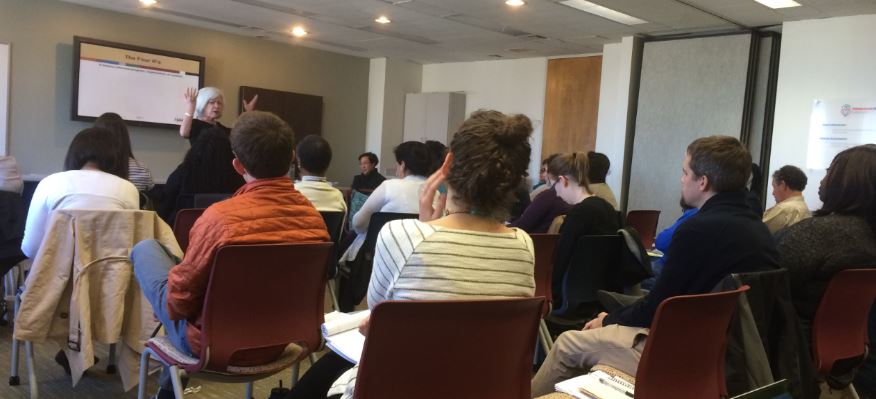In the National Spotlight
Freddie Gray’s death shined a national spotlight on Baltimore and the challenges many of our communities were facing, but Baltimore’s recognition that things needed to change had begun well before the uprising. Not unlike many places in the country, numerous reports have documented the economic, health and social/societal disparities between communities.
Towards the goal of supporting community members and organizations seeking to help promote healing and reduce the occurrence of traumatic events, the Thriving Communities Collaborative began holding meetings in 2015 to raise awareness about Trauma Informed Care and ACES. Importantly, many area organizations had begun looking into adopting trauma-informed practices months, even years earlier.
We recognize that becoming trauma-informed is a process. It won’t happen overnight, but laying a foundation in place for inspiring individual, organizational and systemic change is important. The commitment of City leadership is important, and Baltimore City is looking to develop a city-wide strategy that encompasses all the critical institutions that serve us, from Law Enforcement to Public Schools.
Baltimore’s Path Forward
Following the Baltimore Uprising, under the leadership of Dr. Leana Wen, the Health Commissioner of Baltimore City; Lynn Mumma, the Vice President for Strategy at Behavioral Health Systems Baltimore; as well as the Mayor’s Office on Criminal Justice; Baltimore City began a series of healing circles and trainings to ensure that city government employees, community groups, providers, and individuals were on the path toward healing and were trained on the basics of Trauma Informed Care. This included Healing Circles, Introductory Trauma Informed Practices Training and Train the Trainer Workshops. Additionally, beginning in late August, of 2015, the Health Department initiated B’More Health Talks.
We briefly describe each of these initiatives below.
Healing Circles
The uprising was traumatizing to many in the city. It exposed the pent up frustration and neglect so many youth and adults felt in underserved, neglected, over-policed inner-city communities. The 30 healing circles, held around the city, were designed to begin the healing process.
Employing techniques that included dance, art, and music, healing circle participants were given a voice to communicate their concerns and strategies and methods to help alleviate them that were culturally sensitive. Not surprisingly, these circles revealed the depth of pain, hurt,and trauma so many Baltimore residents are dealing with on a daily basis. But they also revealed the hope and determination that many hold that their lives can and will be better.
Becoming a Trauma-Informed City
Phase I – Introductory Training – Provided by Joan Gillece of SAMHSA, the next phase of the strategy was training in trauma informed care and principles. By providing participants with information about taking a trauma-informed approach to deal with individuals who had experienced extensive trauma in their lives, this phase set the foundation for acknowledging that individual hardships left real physical and emotional changes in the body that required healing and treatment. Over the course of this program, the City was successful in reaching over 1200 city agency employees and community members.

Phase II – Spreading the Word via Learning Collaboratives – With thousands of people in the city needing to embrace trauma informed principles in order to help avoid “re-traumatizing” already hurt individuals, the next phase provided information for individuals to take back to their organizations to help “spread the word” about trauma informed care. These “learning collaboratives” included teams from city agencies and were designed to help individuals understand what they can do within the context of their organizations to respond in a more trauma-informed manner.
Importantly, the city recognizes that becoming trauma-informed is a long-term process requiring the commitment of leadership and the involvement of entire organizations. BHSH is committed to continuing to provide support to help organizations along the path to becoming trauma-informed.
B’More Health Talks
The Health Department launched B’More Health Talks in August of 2015. Structured as a virtual town hall, these bi-weekly talks provide an opportunity for community members to collaborate with the Health Department toward reducing health disparities. The focus of the talks are 1) Youth Health and Wellness, 2) Mental Health and Substance Abuse and 3) Population Health Care and Care for the Most Vulnerable.
You can find more information about the program at the links below.
Next Steps
Baltimore City is in the process of formulating a strategy ensure that all of its key systems and institutions are trauma informed. Baltimore residents and visitors need to be able to experience service in a way that doesn’t re-traumatize individuals. Toward that end, if you or an organization you are involved with believes you can contribute in some way to this effort, be sure to go to the B’More Health Talks website. There is information there on how you can suggest speakers and topics and participate in moving The City forward.
Image credit: Vladimir Badikov’s photostream
